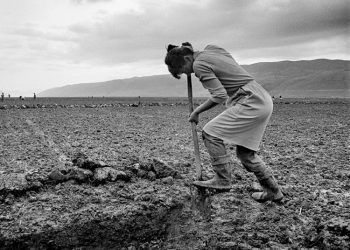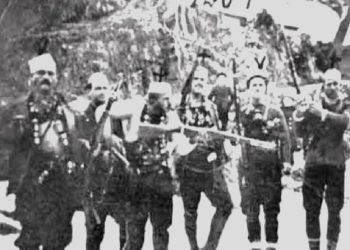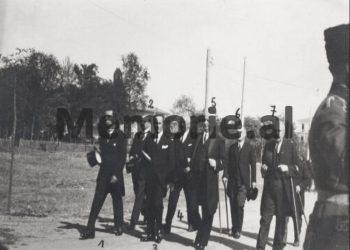Dashnor Kaloçi
Memorie.al publishes the unknown story of Albanians imprisoned in the Nazi camp of Pristina in 1944, who were sent there from the Tirana and Shkodra prisons where they were detained because of their communist activity. What were the young communist youths in Shkodra serving their sentence in that camp, how were they treated by the German command, what were their living conditions, ranging from the food, sleep, work and torture they were subjected to when breaking prison rules, how they were selected? 104 Albanian convicts, who were shot dead on October 13, 1944? The whole painful story according to memories written before the 90s by Agim Bejleri, one of the convicts of that camp (originally from Libohova of Gjirokastra), who was persecuted by the Communist regime of Enver Hoxha, because of brother, because of his Bulgarian wife, whom they were acquainted with in the early 1950s, while he was studying in Prague for Thermo Power Plant Engineering…
On January 27, 1945, Marshal Joseph Stalin’s “Red Army” entered and released the convicts of the Polish Nazi extermination camp, Auschwitz Birkenau, whereas many as 1.2 million convicts had been held since 1939. there, isolated, mainly Jews, Russians, Poles, Roma, etc., who were gassed and then burned in crematoriums.
The German Nazi commander of that camp, Rudolph Hoess, after being arrested by Polish soldiers, was tried and sentenced to death, hanging on a rope, precisely the place where he ordered hanging prisoners in the yard of that camp.
Throughout the Holocaust, about 12 million people lost their lives, of which 6 million, more than half, were Jewish. But given that this camp (Auschwitz Birkenau) was one of the most dreaded of all Nazi camps in Europe, the day of January 27 when it was liberated was symbolically designated as Holocaust Remembrance Day. It is also commemorated in Albania, as hundreds of Albanians were imprisoned in these extermination camps during World War II, and dozens were unlucky enough to return to their families and homes after losing their lives there.
One of the Nazi camps was the one in Pristina, where on October 23, 1944, 104 Albanian convicts were shot dead, who was sent there after being held in detention in Tirana, Durres, Shkodra, etc. their activity as communists and anti-fascists. One of the survivors of this camp was Agim Bejleri, originally from Libohova, Gjirokastra, who was persecuted again during the communist regime of Enver Hoxha because of his Bulgarian wife, (with who had been known since the early 1950s, when he studied in Prague for Thermal Power Engineering), as well as his brother Beiler, who had suffered in Enver Hoxha’s political prisons for years.
Like some of his teammates at the Pristina Camp, such as Kin Dushi, Kristo Budo, Abdyl Banushi, Beqir Xhepa, Abdulla Krutani, Luigj Filipi, etc., and Agim Bejleri who wrote the memoirs before the 90s regarding the period of imprisonment in Pristina Camp. But with some rare exceptions such as well-known writer, Kin Dushit (before he was sentenced to a political prison in the early 1970s), their memoirs were never published in the period of Enver Hoxha’s communist regime, and most of them are still unknown… Given this fact, Memorie.al is publishing in this article some excerpts from Agim Bejleri’s memoirs.
Memories of Agim Bejleri
At the Extermination Camp in Pristina
Complex episodic impressions:
“Memories of an old man who lived
Five generations of his life over 81 years old. “
My family
It comes from a patriotic Libohovite family. When my father died, I was 4 years old. In addition to me were two other brothers and sisters. I remember him lying on the bed where he was languishing. We stood lined up against him. He wanted to see us one last time. He raised his hand towards us and stuttered something between his teeth. When I asked my mother what he wanted to say then, she replied, “Don’t leave my children without school.” His father, Tahsin Beyleri, after completing his secondary education in Ioannina, continued his studies in Istanbul at the Faculty of Economics and Finance and was employed there for years after graduation. In 1910, like many other Albanian patriots, he returned to his hometown, Libohovo, to assist Albania in those difficult years for its “Independence”. Worked in different areas of the country. In the last few years, before his death, we moved to Shkodra, where he was appointed director of the Prefecture’s Finance Department. The younger sister was born in Shkodra, which he named Teuta, in memory of the Illyrian queen of earlier Roman times. In 1931 my father became ill with a serious and hopeless illness that forced us all to return to our home in Libohovo, where he died. His mother, Seadet Zhuzhuni – Beyler, was widowed at the age of 33. The eldest of the children, Isa, was 12 years old and the youngest, Teuta, had not reached the first 6 months of life.
The father died, but his message, “Don’t leave my children without school,” was cemented in her memory. She felt life would be much more difficult without the education of children. The elementary school was then with 5 classes. My two older brothers, Isa and Fatri, had to go higher, so in 1933, we moved to Gjirokastra, where they had begun teaching in the newly built gymnasium. There I finished elementary school. During all this time, the patriotism of our ancestors was also imprinted on us. Later to continue our studies in the upper classes we moved to Shkodra, where the Nazi fascist occupation found us. Our family, like many other patriotic Libohovite and Shkodra families, lined up on the LNC side, becoming one of its important bases.
In June 1944, our house fell into disrepair and we were arrested by all five children, of whom, by interfering with her many acquaintances, the others were quickly released, and to me, considered the most dangerous. , kept me for further investigation. Prior to his arrest in late May 1944, after a lengthy stay in the cold waters of the Middle Bridge, he was seriously ill with a loss of blood. Only the quick help of Doctor Koplik saved me. “You have to be very attentive for a few weeks until the ailment closes well, especially to avoid body overload,” the doctor cordially told me. It was the time when a Nazi missionary of the Kuislinge government, Mato Murati, came to Shkodra, who was making numerous arrests on the student youth, certainly aided by the reports of a faint student during his torturous interrogation. To cure and escape arrest and detention, I went to Tirana with some relatives. But there, too, they suddenly found me and sent me with two armed gendarmes to Shkodra. During interrogations, I was confronted by two of my predecessors, one high school student and the other a nun with the nickname “Lemon,” who continued to portray me as a National Liberation War activist, a statement that I firmly rejected. accusing them of slander to save their skin, despite intimidating and torturous beatings.
My mother Mato had told him: “I will chop gibs with scissors until he opens his mouth and sings.” A few days later, along with many other prisoners, we were ordered to the northeast by German command.
On the way to Camp…
At the command of the German command, a few days before our departure, all the political prisoners from Shkodra and Tirana came to us, in a camp surrounded by barbed wire, where after two days with trucks accompanied by armed soldiers, they took us. towards the Puka Highlands, Prizren’s Kukes to Pristina. On the way, we stopped at two stations, places of residence of the German wards. I especially remember the duck in Prizren. It was so small that we could not rotate against each other. The ventilation was done only through a grating window near the lower ceiling, where we would stay indoors for hours without water, without bread and toilets. The smell was so heavy that two or three elderly people fainted and mourned.
Kin Dushi was caught with worms between his toes, bleeding during whips in the Shkodra police station. We had nothing to disinfect and heal the wounds. The SS didn’t want to know about these. They just scolded us, screamed and hit us when we asked for help.
We didn’t know for sure where they would take us. Some said:
“In Germany, they lack workers in factories” – others scared to say:
“It is possible to get us into the gas-throttle cameras, to use the bodies for soap, and to peel the skin from which they produce bags for their wives” – and other such supposed fabrications. We finally arrived at Camp Pristina, but not all of them. Some were segregated along the way and never knew where they ended up.
Short announcements of its construction
The camp was built on a hillside (then on the outskirts of Pristina), surrounded by two rows of barbed wire about two meters high. Tall towers with heavily armed guards were erected on every corner between them.
The dormitories for the internees were used as horse stables of the military departments, with ceilings and tiled roofs tightly interlocked. Just at the end of the first camp, where the prisoners from Shkodra were taken, there was a thick-walled ceiling compartment where, before the arrival of the Germans, equestrian soldiers lived.
On the inner walls of the two opposite sides of the stall were two-storeyed common dormitories, where we lay tight like sardines one after the other. In the middle of one side was the iron entrance gate that closed all night and opened early in the morning. In the courtyard, in front of the gates of the silos, our forced linings developed daily. In the back yard, there was a deep well that served for the whole camp, to drink and to wash. Inside and outside the silos there were no taps or baths. As a toilet, a deep pit with a plank above was opened for shared use where we could talk to each other.
Two of his troops, who had tried to flee and capture them, forced them through successive whiplash head-thrusts into the toilet pit and then moved around with the knees and elbows leftover channels. This show ended with their firing. But there was also a case that they suffered from their own mistakes, without the need for Nazi intervention. It was rumored that 2-3 people, in order to save some gold coins during the petty check-in at the camp, had swallowed these and were removing the “olive blacks” to get them out of their excrement. The entire camp was also within the military enclave and the guards, separated from the rest of the city.
Food and internal organization
Breakfast consisted of a so-called sugar-free tea, lunch from a soup cooked with bones and leftovers from the cafeteria of the soldiers guarding us, evening tea again. The daily serving of black bread was 150-200 grams divided into three vats. In each captain, the commander assigned a “captor” among the most zealous internees to serve them with savagery evident to us and to inform them of whatever was going on inside the room. They too used rubber whips to lightly lift us up whenever his superiors came in, shouting out loud and commanding:
“Achtung” – honoring them alla-hitlerian with the other hand. The internees from Tirana, in memory of the spy and terrorist “Gj… F….”, Gave this name to their captain because they resembled each other as two portraits of convinced fascist spies and executives. Every morning we had to line up to do some formidable gymnastics, and then it was time for the division of labor for tasks inside and outside the camp. The choice was made by the supreme commander himself, who passed through the rows and pointed the whip to the person who would work according to the daily requirements presented to him.
The first few days at work
We made the first job outs within the military fence. These were mainly camp-related services for loading and unloading weapons. They were later deployed outside, to military facilities in the city accompanied by armed guards.
The most frequent and difficult were the unloading of 50-pound sacks, from railway wagons to military trucks. When I first had such a sack on my shoulders, I lost my balance and fell to the ground. The guard nearby immediately directed the rifle barrel towards me but as the friends ran and managed to get the unharmed sack on me.
I saved it well! Whoever did not stand up was shot in the spot.
At the Military Hospital, where Austrian soldiers served as guards, relations with them and with hospital staff were better. I remember a special gesture of a chef watching us how we inhaled the smell of food as we walked past the door where he worked. One day suddenly and quickly he gave each of us three pieces of roasted, tender meat. In the hospital, we performed various tasks as appropriate. We often had to transport the dead from wounds or during operations, especially when the front line of fighting approached Pristina. The hardest thing was to put them in the taboo. In one such case, one of my friends said: – “What are these crazy generals planning these horrible, bloody wars without pointing their head that they are destroying the flower of boyhood!”
“On their blood and their bodies they seek personal glory and power” – we concluded all three of our philosophical conversation.
Each 25 lashes on the back
Some seniors who were unable to work often referred to us as young people:
– “Aman, get us some cigarette butts thrown on the road or in the trash cans because our nostrils have been ripped apart.” As we worked in the hospital, we were often allowed to pass in front of the garbage cans by packages sent to the military by their loved ones’ families. Once we saw our cigarettes and our peace of mind scattered in front of the door and decided to take the opportunity to answer their prayer. With great fear and care, we concealed some peace through the bow and back without being dictated. But we forgot the check-in at the entrance to the camp was usually easy. What we were expecting happened. One of the controllers had miracle instincts like being and smelling the cigarette smell and discovered the packages hidden in our bodies. Immediately the call came and the commander himself with the skull of death on his forehead came. He had a large, healthy body, with a look like an exasperated beast, and after removing his jacket, grabbed the first one from us, stripped him naked from the middle and up with his hands tied behind his back, leaned over the table so that he’s back and the thick gums looked good and with the twisted wire whip began to strike with how much power it had. After each hit, bloodstains danced from the beaten places and continued for 25 consecutive times. I was third. The footage from the first two terrified me but at the same time prepared me psychologically to cope with the shocks on my body more easily.
“We’re closing this time,” he told the translator who was accompanying him on this excruciating performance. At the entrance to the camp, friends who saw us with bloodied shirts and impossible things took us to the dorms where we had to sleep with our stomachs down until our wounds closed. I do not forget the help and care provided to us by a Serbian doctor, interned like us, who had created a sanitary point in a corner of the dorm. He stayed with us until we were fully healed.
The first mass casualties from our ranks
So we were lined up when the first victims were pulled out of the camp to shoot them on the outskirts of Kukes, in retaliation for partisan actions on the other side. Even today as I am writing, I see footage filmed in the brain, with the faces of my friends when they were separated in a corner and rode in trucks in the direction of the unsuspecting. I cannot forget their last greeting, especially to my old friend Shaban Huti with whom I slept alongside the common dormitory of Xheladin Fishta, a family friend and brother of my close friend Iljazi’s classmate, Uncle Naim Gjylbegu, our neighbor. in Iagen Zdralej and many others. There were a total of 60 people in between and Isa Golem, who, along with several others, returned to the camp and told us the last minutes, before their shooting:
– “We were awaiting death when a German officer suddenly came hurrying and ordered the cessation of the firing of our last remaining group” – ie. the shotguns were about 54 because 5-6 of them were back again – Jesus showed us the beatings and tortures they had done before taking them to the common pit. Later we learned that one of the survivors was Sabri Hoti. Who, as they were being taken to the shooting range, at an opportune moment, had run into the woods and fled deep among the thick trees. Fearing in the heart, she did not stop as a guest at a patriotic home, where they dressed her and accompanied her as their own man. The news of the killings of political prisoners in Shkodra reached our homes as well, so families came to Pristina trying to find in our line of work whether their loved ones were still alive. I was embarrassed when I spotted my mother with the black shiff on her head with that terrified look and my eyes filled with tears, but I still summed myself up and raised my hand, saying:
– “Here, here I am, Dawn, still alive.”
She, in turn, split the crowd, came forward and raised both hands up.
We both got the message from one another: “Life goes on.”
And so we spent a few weeks waiting for other events until we came to it
The tragic evening of October 23, 1944
It was a gloomy morning, with heavy fog and rain. We were lined up as usual but the selection of workers was not the same as before. The commander stood in front of the list with a list in hand and was reading one after another the names of Tirana prisoners to be singled out in the rooftop room adjacent to our captain. After reading 100 names the door to the dormitory for girls and interned women was locked and the rest of us locked in our lockers as well. We all felt something extraordinary was happening. In the evening from the north side of the camp, machine guns were heard firing and restarting. Just a day before a deep pit had been dug by three groups of our friends. Meanwhile, just at the time when the German roommate was hearing German screaming and shouting, someone in the room shouted:
– “They’re killing our friends! – ”
These shocking words mentioned us by the asphyxia that had seized us and turned us into the bitter and painful reality. They were really killing them !. Lightning flashed in front of me, my friend and friend Venetik Hoxha, as he stared at the corner as they separated from us as if to say:
– “Dawn we’ll see you again!” –
At this time, in the women ‘s room, next to us, there were noises, and after them, there were running on the ceiling and throwing some people into our camp. But it didn’t hurt too much. Suddenly the doors of the great gate opened and 5-6 Germans entered with the commander in chief, with rifles ready for firing. And with a strong “Achtung” they demanded our lining in front of them. We quickly lined up. Through the translator we heard:
– “Those who leave the room go out on their own, otherwise we will kill them all!” Quiet grave! After a while a shy voice cried out:
– “Come out they’ll make us all as we are”
Towards the end of the line, there is a real brave man, who turned to us with the words:
– “Death to Fascism Comrades, Freedom of the People!”
It was Musa Agolli from Debar. Immediately they grabbed him by the arms and slammed him out of the door where they closed his mouth, piercing his chest with a barrage of bullets. As the massacre ended, the Hitlerian butcher continued to pass through our ranks, illuminating each one’s face with a hand lantern and ordering the removal of those who were to be massacred that night. From this selection, he surpassed the number of casualties from 100 to 104. I particularly wish to dwell on the case of one of those unfortunates who had to be sacrificed without being on the list at the event. Xhavit Jukniu, a high school student and brother of Burhan Jukniu, a close friend and friend of mine, appeared to be lined up to pierce his finger in a shaver, unknowingly rubbing his forehead, a mark sufficient for the bloodthirsty vampire to ignore the victim’s firm objections that he was not on the list. But in vain! Everyone was covered in that hell pit. Among them were many prominent high school students and university students from Tirana. Coincidentally, I recently heard that one of them, Professor Ligor Gjika from Himara Qeparoi, had escaped being killed at the time the pellets came out of the rifle’s mouth and, taking advantage of the fact that they were not yet covered with clay-like and out of the darkness of night, he carefully escaped from the scene outside the military area and on the way he met lovers who rescued him.
The day after the massacre, only a group of Macedonian villagers were driven out of the camp to cover the cemetery with the bodies massacred and adjacent to it to open another cemetery, which remained as the “Sword of Damocles” in our heads.
Approaching the front of the fighting. November 1944
A few days later, thunder cannons began to be heard in the East that raised our feelings that better events could happen when we saw that the dead skulls were also concerned. They were gradually being replaced by ordinary soldiers or their bashibozuks. Indescribable joy was brought to our heads when a low-flying anti-aircraft plane rolled over our heads, releasing hundreds of thousands of hopeful flyers. Some of his workmates indicated that the death toll in Germany was increasing and preparations for an immediate evacuation were observed. Our hopes of living were increased.
But one day, in late October 1944, we were all lined up and given a barrage of shovels, accompanied by numerous servicemen, to open defensive trenches, but we realized at first that we were opening our cemeteries. Once again, we survived, given that it was rumored that all internees would be killed. The pit was still open before the camp! All of these alerts forced us to take better self-defense measures with our illegal detention camps. There was no talk of fellow fighters in the conspiracy divisions of the leader. The captains of the rooms left by themselves and some of their servants disappeared without understanding. The other suspects were under great surveillance by us.
The secret battalion of our captain, which until that day was held in a deep conspiracy, was expanding and operating more openly. The commander, Hysë Zaja, with his associates dealt with the reshaping and upgrading of platoons and extending their activity to all the dormitories. Sadushi and I continued to be part of the first platoon headed by Ymer Pahija.
The commander could no longer enter the camp and still worked closely with the translator, his faithful counselor, by bargaining with our relatives who had come overwhelmingly to hear that they could release us at very low prices. It was clear that he was preparing to support her as soon as possible but securing as much money as possible. Even in these days when we went to work in the trenches, we sang war songs especially the song:
“Revenge is called by the martyrs from the grave
That their blood must be washed with blood.
Young revenge, the martyr exclaims
That fell for Freedom in its own land. ”
I remember the lively singing of these songs and the greatest friendship we had, especially with those we knew as young as Sadush Kumbaro, Qemal Lazani, Sel Hoti, Vladimir Misja, Osman Haxhija, Isa Golemi, Petrit Bushati, etc.
Meeting our people and leaving for Shkodra
On November 7, 1944, we were called to work, but as we left the camp some of us, including Uncle Ferdi with Sadush, Osman and me, directed us to meet with our family members who were waiting for us on the Prishtina – Prizren motorway, where we all got in a car and headed for Shkodra where we fell in love with the people of the house. Along the way, we found out that Fetije Kumbaro, Laje Haxhija, and Seadete Bejleri had paid for our release of 20 Napoles of gold, against 50 Napoles they had requested 3-4 weeks ago. My mother hijacked this precious gift from her marriage. The next day we were forced to move to the Partizan Group after Shkodra had returned as the last hideout of all Nazi-fascist rubbish in their last days on Albanian territory. In order not to endanger themselves, they continued to hold the population in panic and terror, with their armed loyalists following them like kennels from behind.
End of the series “In the Nazi extermination camp of Pristina”.
June 2008 Agim Bejleri
Memorie.al




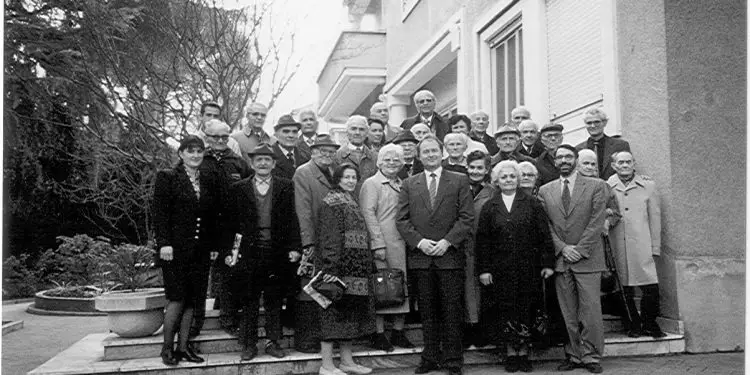
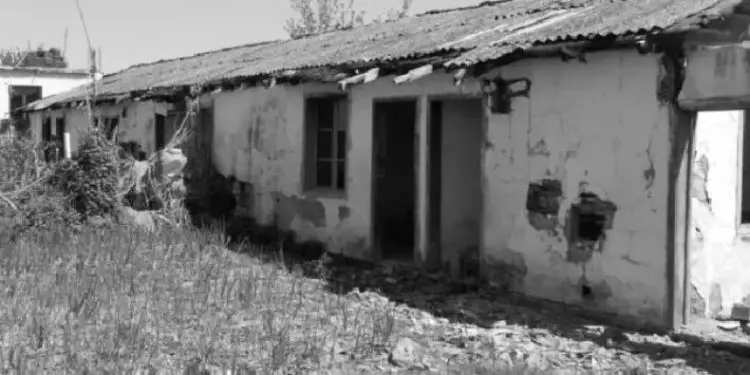
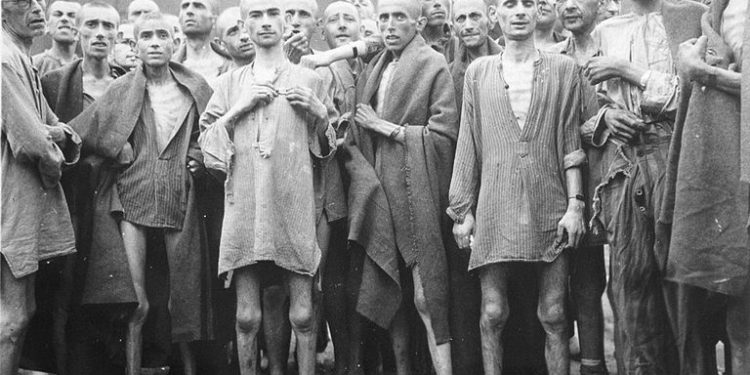
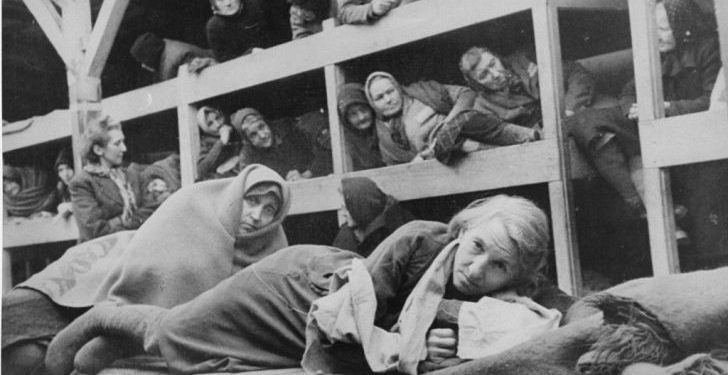
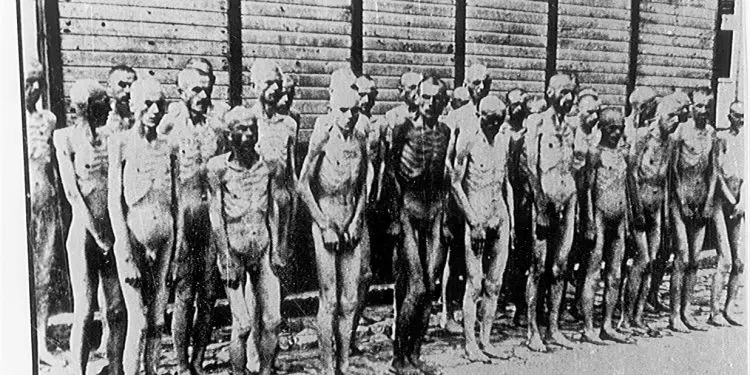
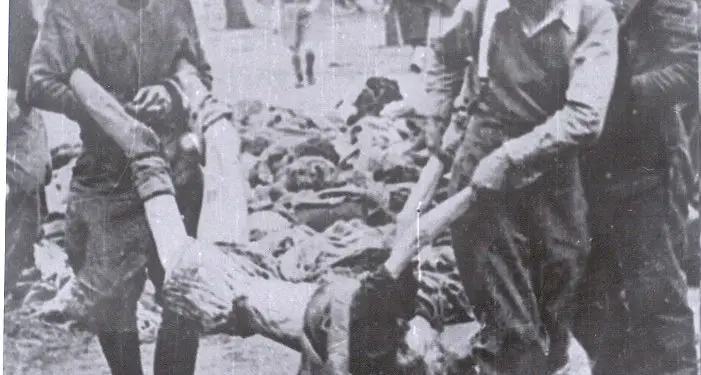
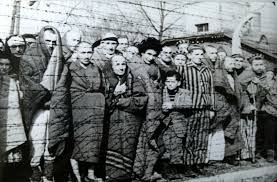
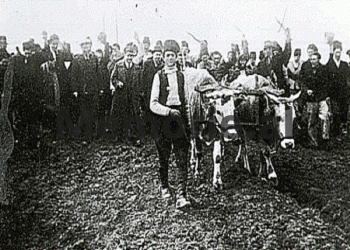
![“They have given her [the permission], but if possible, they should revoke it, as I believe it shouldn’t have been granted. I don’t know what she’s up to now…” / Enver Hoxha’s letter uncovered regarding a martyr’s mother seeking to visit Turkey.](https://memorie.al/wp-content/uploads/2026/01/Dok-1-350x250.jpg)

